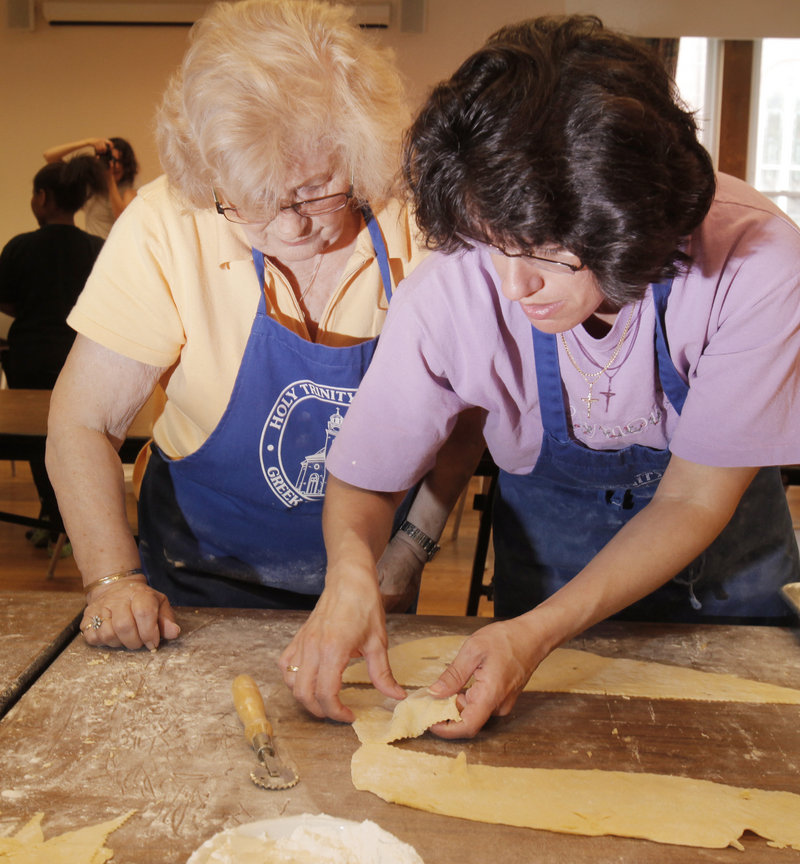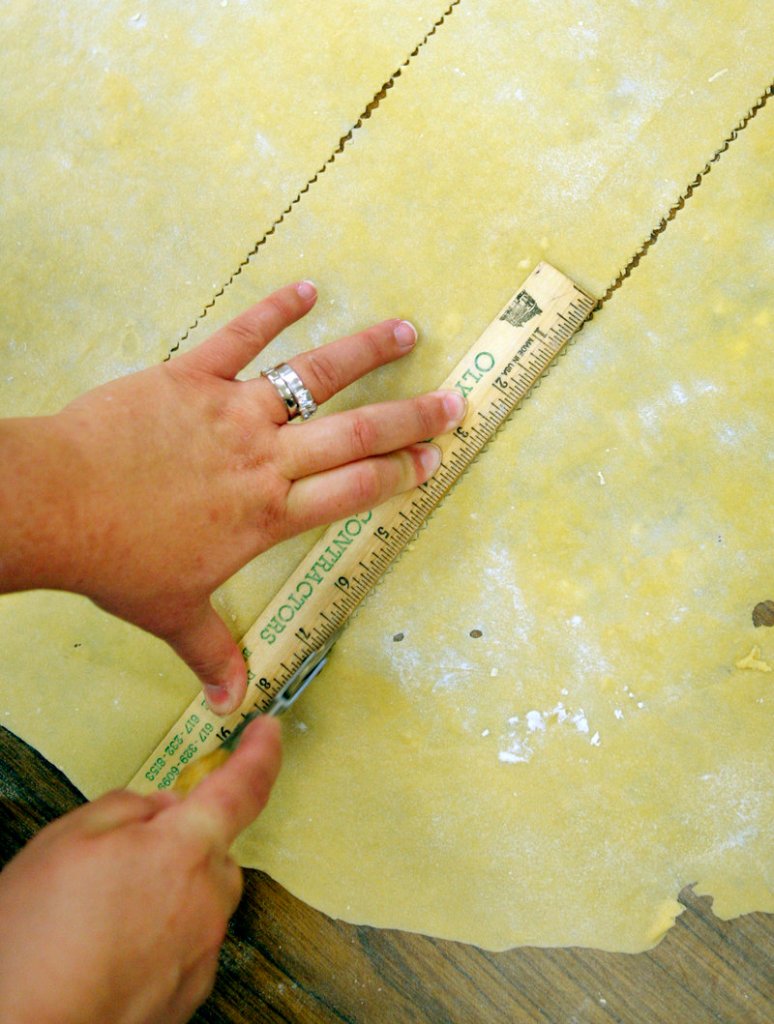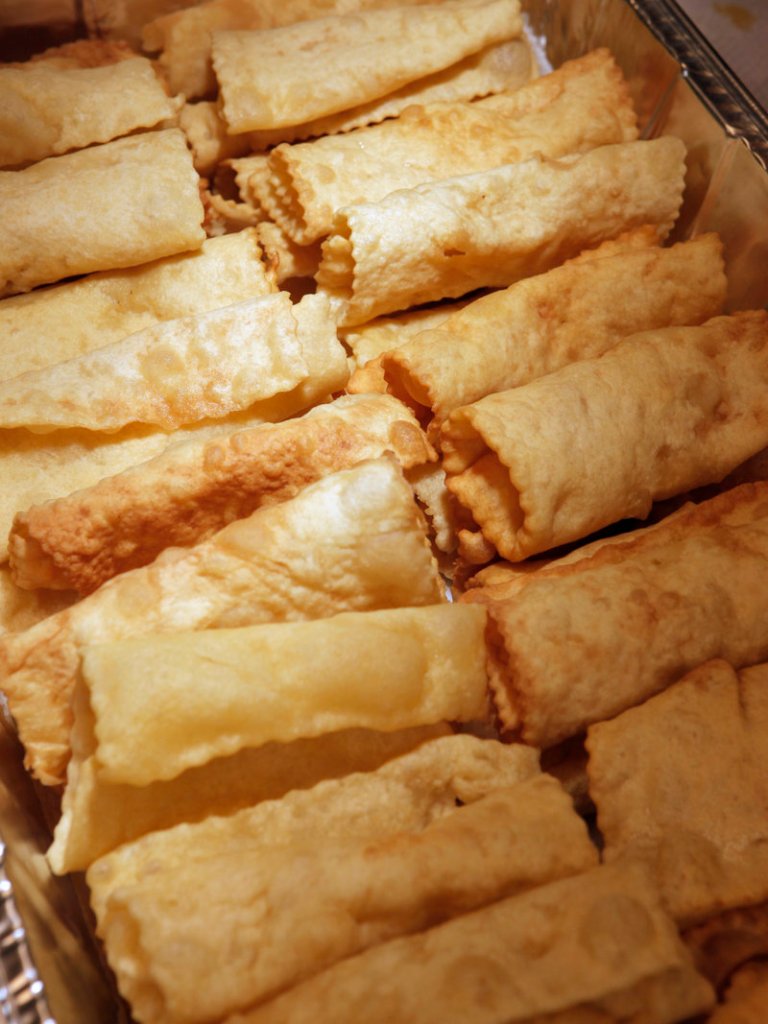PORTLAND – Maria Economos held court at the stove in the parish hall of Holy Trinity Greek Orthodox Church, a pan of hot canola oil awaiting her next piece of delicate pastry dough.
“You’ve got to have the knack, and I do,” insisted the 87-year-old Economos as she surveyed the kitchen table behind her and fastidiously hand-picked the next square of dough to fry. “I’ve been doing this since I was 13 years old.”
She chose one particular square over all the others, commenting that “the lady who rolled this dough, she knows her stuff.”
The square had been rolled paper thin, to the point where it became nearly transparent when Economos held it up to the light. “Oh, this is delicious,” she said as she gently laid the dough into the oil and watched as it puffed up a little. “This is like my mother’s.”
She gently rolled it in the oil, forming it into a shape that looked like an Italian cannoli. Don’t cook the squares too long, Economos warned, or they will stiffen and won’t roll up.
This fried, flaky treat with a soft crunch is known as thiples. Just before serving, the pastries will be dipped in real honey and then sprinkled with cinnamon and walnuts.
Economos and about 20 other ladies of Holy Trinity spent last week – “Pastry Week” – toiling over thiples and several other traditional pastries that will be served at the 2010 Greek Food Festival.
The festival starts Thursday and runs through Saturday night, but preparations began in April – yes, April – when church members started meeting in crews of 20 or 30 to make all the food.
Everything is homemade. The crews make and freeze what they can ahead of time because the festival, the church’s major fundraiser for the year, attracts as many as 10,000 people over three days. The dolmathes and spanakopita were made in April, followed by the baklava, moussaka and pastitsio in May.
Making the baklava takes about 40 people, according to Greg Tselikis, a retired lawyer who serves as chair of the festival and errand boy for the cooks. He runs out to buy 75 pounds of flour whenever the ladies need it.
And it is almost all ladies. A handful of men come to help during pastry week, but mostly they wait until it’s time to prepare the roasted chicken and marinate the lamb for kabobs. It’s “a cultural thing,” Tselikis said.
During pastry week, the ladies come to the parish hall every day to roll pastry dough and make cookies and cakes for several hours. They socialize and listen to Greek music as they work, sometimes fussing with each other over the way things should be done.
It’s a little like being in a room with dozens of Greek yia yias, or grandmothers. (“You want a cup of coffee, honey? You sure, dear? You want some soda?”)
“They basically knock off one (pastry) a day,” Tselikis said. “They’ll make 3,000 koulourakia and probably 1,500 paxemathia, maybe 2,000 kourambiethes. So there’s well over 10,000 pieces of individual items, probably closer to 12,000.”
How do they know how much to make? Experience. The festival has been held since 1982.
But in recent years, it seems as if no matter how much food the church volunteers produce, it’s never quite enough.
“Four or five years ago, we just started selling out of everything,” Tselikis said. “So what we do is we make all we can make. We’re at capacity in terms of our physical space, so we just make as many as we can make with the relative assurance that by 8:30 Saturday night it will all be gone. And that’s basically what happens.”
Everyone has a job. The same couple of women are tasked each year with watching over the three double boilers used to make the bechamel sauce for the moussaka and the pastitsio, which is kind of like a Greek macaroni and cheese,
Margarita LaRossa keeps things moving and organized. She’s been working on the festival since 1994, when she was in her 20s, newly married, and didn’t know how to cook.
Now she’s in charge. And she knows everything, from how to tweak a recipe so it will make thousands of cookies to the fact that it takes more than 4,000 grape leaves shipped from California to make the dolmathes.
“Margarita is incredibly hard working,” Tselikis said. “The woman, you can’t describe what she does. She’s a little bit of a thing, and she works like a demon.”
On Wednesday of pastry week, in addition to making thiples, LaRossa also had a crew stuffing dates with walnuts for the finikis, date-filled walnut cookies dipped in a syrup of sugar, water, honey and orange, “similar to a baklava, but a little lighter.”
“Are you Greek?” Helen Delaney asked Caroline Sprague as they stuffed dates at a table.
“I’m half Greek,” Sprague replied.
“I’m half Greek, too,” Delaney said. “The other half, I don’t know what it is.”
Sprague and Delaney are among the younger women who volunteer during pastry week because they want to learn from the more experienced women how to make these traditional Greek specialties. Sprague says she sometimes prepares spanakopita at home, but is “very much a rookie” when it comes to sweets.
“”My mom’s Greek and my grandparents are from Greece, so we always grew up with it in the house,” Delaney said. “But I came because I wanted to learn how to make this stuff.”
Their teachers are volunteers like Anna Morrell, who has been helping make food for the festival for 15 years. Morrell’s grandchildren are grown now, and seven years ago she lost her husband of 48 years. She volunteers because she enjoys socializing with the other women and meeting new people during the festival.
“What am I going to do at home without my honey?” she said. “I’m a person that’s got to keep going. I’m like my mom. My mom was a tiny Greek woman from the old country.”
Sophie Kourakos, wearing an apron that says “Super Greek,” is one of the most experienced volunteers, having worked on the festival since the year it started.
“We’re so proud of making the food as if it’s for our own home,” said Kourakos, who is 81. “We don’t substitute anything.”
The women all enjoy being with each other, she said, and they all get along.
Well, most of the time. But any disagreements are friendly ones.
“There was a huge fight yesterday about ‘You’re cutting it wrong. My grandmother used to cut it this way,’ ” Tselikis said. “These are very traditional recipes.”
The thiples recipe comes from 88-year-old Rosella Dragoumanos, who at first seemed a little horrified at the thought of discussing it. Assured that no one was asking her to give away the exact recipe, she described in general terms how she makes the pastry.
“You have to beat the eggs well, that’s the main thing,” Dragoumanos said. “And then you add your sugar, your baking powder and flour – as much as it takes. And make sure the dough isn’t too stiff. You’re not making bread.”
How do you know how thin to roll the dough?
“You know what?” Dragoumanos said. “This little old lady showed me how, and she said you blow on it. And if the dough comes up, it’s done. It’s fluffy.
“I love to make it.”
Staff Writer Meredith Goad can be contacted at 791-6332 or at: mgoad@pressherald.com
Send questions/comments to the editors.






